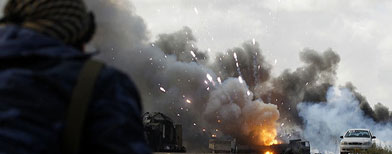CASPER
New member

President Barack Obama, speaking in Santiago, Chile on Monday, defended his decision to order U.S. strikes against Libyan military targets, and insisted that the mission is clear.
And like a parade of Pentagon officials the past few days, Obama insisted that the United States' lead military role will be turned over—"in days, not weeks"—to an international command of which the United States will be just one part.
The only problem: None of the countries in the international coalition can yet agree on to whom or how the United States should hand off responsibilities.
The sense of urgency among White House officials to resolve the command dispute is profound: with each hour the U.S. remains in charge of yet another Middle East military intervention, Congress steps up criticism that Obama went to war in Libya without first getting its blessing, nor defining precisely what the end-game will be. (On Monday, Obama sent Congress official notification that he had ordered the U.S. military two days earlier to commence operations "to prevent humanitarian catastrophe" in Libya and support the international coalition implementing UN Security Council Resolution 1973.)
Below, an explainer on the military mission in Libya, the dispute over who should command it after its initial phase, and whether the military is concerned about mission creep.
What is the U.S. military task in Libya?
The military mission in Libya is implementing U.N. Security Council Resolution 1973, which calls for Gadhafi's forces to pull back from rebel-held towns, and the establishment of a no-fly zone to protect Libyan civilians from attack by Gadhafi, and for civilians to be allowed access to food, water and other humanitarian supplies.
Is the U.S. military trying to kill Gadhafi?
No, the U.S. military is not authorized to kill Gadhafi, said Gen. Carter Ham, the commander of U.S. African Command at a press conference in Stuttgart, Germany, Monday. Ham's command is currently leading the first phase of the international coalition effort to establish a no-fly zone in Libya, together with the United Kingdom and France. Nor is the U.S. military currently coordinating with anti-Gadhafi rebels or authorized to provide them military support, Ham said.
The main objective, Ham stressed, is to protect civilians from attack. "The military mission is very clear, frankly. What is expected of us to do is establish a no fly zone to protect civilians, to get withdrawal of regime ground forces out of Benghazi," Ham said. "What we look forward to is the transition to designating the headquarters" of the command of the next phase of operations.
How can the coalition reconcile a military mission that could leave Gadhafi in power with the many calls for his removal?
On Monday, Obama answered this by underlining the language of UN Security Council resolution 1973, which calls for protecting civilians from attack. That narrow military mission is distinct, Obama said, from the larger political goal of seeing Gadhafi step down—a call that Obama himself has repeatedly echoed, along with other major Western diplomatic players such as Secretary of State Hillary Clinton and French President Nicolas Sarkozy. The international community has other non-military tools to achieve that goal, Obama said, such as economic sanctions, diplomatic isolation, international war crimes investigation, and cutting off the Gadhafi regime's access to financial assets abroad.
